Canada’s New Visa Support for Wildfire-Affected Residents
Supporting Communities Affected by Wildfires in Canada
As Canada faces climate changes that lead to more severe weather, including wildfires, the government is stepping up to help those impacted. If you’re considering making Canada your home, understanding these supports can be crucial, especially if you are navigating visa sponsorship or aiming for permanent residency (PR).
Special Measures for Affected Individuals
On July 2, 2025, the Honourable Lena Metlege Diab, Canada’s Immigration Minister, announced initiatives focused on assisting those affected by wildfires. This isn’t just for Canadian citizens; it includes temporary residents too! If your Canadian travel documents or PR cards were lost or damaged due to the wildfires, you can apply for free replacements. Those who already paid for replacements after April 1, 2025, can even request a refund.
What About Temporary Residents?
If you’re an international student, temporary foreign worker, or visitor impacted by the fires, the government is easing some requirements. You can replace your status documents and renew your work or study permits without any fees. Importantly, the usual 90-day limit to restore your status is being waived, giving you more flexibility during these challenging times.
Support for Emergency Personnel
For those arriving in Canada to assist with wildfire efforts, application and biometric fees are being waived until November 30, 2025. This makes it easier for skilled professionals to come and help during emergencies.
Understanding these measures can not only support you in your recovery efforts but can also provide insight into how Canada values community welfare. This focus can be appealing for anyone considering a long-term move, whether through employment or a pathway to PR.
Pathways to Canadian Employment
As you explore opportunities, remember that understanding the immigration landscape is essential. The Express Entry system is the primary pathway for skilled workers. It uses the Comprehensive Ranking System (CRS) to score candidates based on age, education, language skills, and work experience. An offer of employment can boost your score and may assist you in obtaining an LMIA (Labour Market Impact Assessment), which is required for many foreign workers to get a work permit in Canada.
Alternatively, provinces have their own Provincial Nominee Programs (PNP) that enable them to choose candidates who meet regional labour market needs. This is a great route for international job seekers who have skills in high demand.
In conclusion, the Canadian government shows commitment not just to those living here but also to international newcomers. These supportive measures during times of crisis demonstrate Canada’s readiness to welcome new talent and foster a sustainable and inclusive future.
Tell us what you’re thinking.
Drop your thoughts or questions below. We read every comment and reply when we can.


